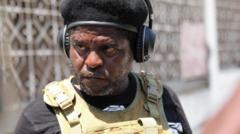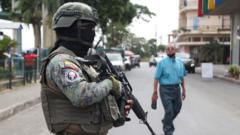In response to soaring crime and gang violence, parents in Cape Town are increasingly opting to send their children to former white-only schools, despite the challenges of long commutes. This trend underscores the persistent inequalities in South Africa's education system decades after the end of apartheid.
Cape Town's Crime Crisis Forces Families to Leave Township Schools for Safety

Cape Town's Crime Crisis Forces Families to Leave Township Schools for Safety
Safety concerns in Cape Town's violent townships drive parents to enroll their children in former white-only schools, highlighting ongoing educational inequalities post-apartheid.
In Cape Town's notorious townships, where the legacy of apartheid lingers, parents are making hard choices for their children's education. Fears of crime and escalating gang violence are compelling families to transfer their children to former white-only schools, despite the long daily commutes involved.
Sibahle Mbasana, a concerned mother, recounted traumatic experiences at her sons’ previous school in Khayelitsha, Cape Town’s largest township. "Thugs would go into the school carrying guns, threatening teachers," she explained, emphasizing the lack of security. With insufficient measures in place, this situation has led many parents to view transferring to safer schools as their only option.
Though apartheid formally ended over three decades ago, inequalities in the educational system remain starkly evident. The Bantu Education Act of 1953 established a segregated and inferior schooling system for black students, consequences of which are still felt in overcrowded township schools that are often rife with violence and gang activity.
Mrs. Mbasana felt compelled to transfer her three children to a state school 40 kilometers away in Simon's Town, where they would have access to better facilities and lower class sizes. While this choice offers an improvement in educational quality, it comes with the burden of long commutes that can stretch up to 80 kilometers for many pupils.
These educational struggles are exacerbated by dangerous journeys faced by children, who often begin their day at 4:30 AM. The lack of safe transport options is particularly concerning, as children must navigate the streets of their townships, frequently encountering the threat of violence on their way to school.
Educators in the area echo the concerns of parents, revealing that teachers at some township schools are extorted by gangs demanding protection fees. With basic safety compromised, many teachers feel pressured to abandon their positions, which only worsens the educational environment.
Despite a government initiative to provide private security and police patrols in troubled areas, the efficacy of these measures in ensuring safe learning conditions remains to be seen. The Western Cape Education Department has acknowledged the ongoing struggles, but overwhelming systemic issues—stemming from historical inequities—continue to challenge educational progress in these regions.
Parents like Mrs. Mbasana, who long for a life beyond the township, are increasingly frustrated. The stark travel conditions combined with the pursuit of quality education reflect the deep-rooted inequalities still present in contemporary South Africa.
Overall, the exodus from township schools to established suburban institutions raises serious questions about the future of education equality in South Africa. As parents grapple with safety concerns and strenuous commutes, it becomes clear that without significant reform and investment, many children will continue to face an uphill battle in pursuit of educational success.


















